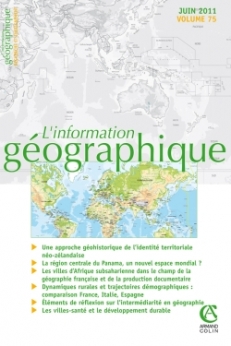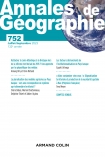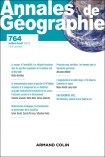
L'information géographique - Vol. 75 (2/2011)
Pour acheter ce numéro, contactez-nous
Recevez les numéros de l'année en cours et accédez à l'intégralité des articles en ligne.
Comment se forge, à travers le temps, une identité territoriale renforçant le processus de construction nationale ? Selon quelles temporalités des discours mythologiques à connotation spatiale se développent-ils pour assurer la prise de conscience collective de valeurs communes ? La société néo-zélandaise offre la possibilité d’une approche dynamique du concept de territoire. La posture géohistorique adoptée ici montre que ces discours rassembleurs émergent à des périodes de rapports de force sociaux remettant en cause des principes initiaux de représentation, d’organisation, de partage de l’espace, et présente ainsi le territoire comme un acteur de la vie politique en ce qu’il révèle la non-réalisation de projets de société et fait l’objet d’une instrumentalisation symbolique à vocation fédératrice.
How a territorial identity strengthening the process of national construction builds up itself through time? What are the development temporalities of spatially connoted mythological speeches allowing the rise of a collective consciousness of shared values? This article tries to answer these questions by proposing, through the example of the New Zealand society, a dynamic approach of the concept of territory. The geohistorical approach used here shows that these rallying speeches appear in periods of balance of social power questioning initial principles of representation, organization, sharing of space, and present the territory as an actor of the political life in the fact that it reveals the failures of the plans of a society, and is the object of symbolic appropriations developed in contexts of federative strategies. We will then see how the New Zealand society has managed to transcend its internal tensions and to maintain its territorial integrity thanks to constant references to a rural imaginary.

